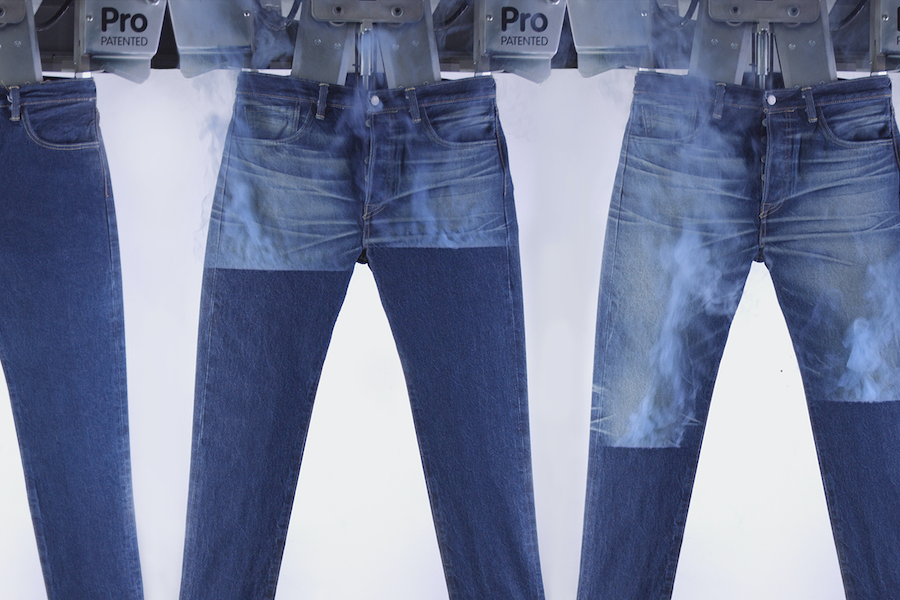#Sustainability
Green Button: The government-led textile certification label celebrates its third anniversary and presents new standard version
90% of our textiles are produced in countries of the Global South -often under inadequate conditions. To curb unpaid overtime for seamstresses or the use of hazardous chemicals, companies in industrialised nations must fulfill their due diligence obligations. The government-run textile certification label Green Button shows which companies fulfill their responsibility for people and the environment in their textile supply chains and distinguishes their sustainable products. The record is positive.
- Only three years after its market launch, the Green Button is already known to largesections of the public: According to a recent representative survey by the Gesellschaft für Konsumforschung (GfK Fashion Consumer Panel 2022), 44% of people in Germany are already aware of the certification label, and over half (52%) of them have already consciously purchased at least one Green Button certified product.
- Over 90 companies offer products that meet the demanding requirements for corporate due diligence and socially and environmentally sustainable production. Since its launch, more than 260 million Green Button textileshave already been sold.
- The government-run certification label is increasingly aligning itself internationally. Among the Green Button licensees are several European companies. In addition, the Green Button has been a registered trademark with the European Union Intellectual Property Office (EUIPO) since March 2021.
- The Green Button has also arrived in sustainable procurement. Whether it's workwear for the railroads and police or the bed linen in large hotel chains and hospitals: More and more public institutions are opting for sustainable textiles with the Green Button.
- Just in time for its anniversary, the certification label is launching a new standard version: with a one-year transition period, the "Green Button 2.0" will apply from August this year -a further development of the previous criteria with even more comprehensive requirements and specifications for the raw material level.
Ulrich Plein heads the Green Button Secretariat. He assesses the impact of the certification label positively: "I am pleased about the Green Button success story because it puts people in the production countries in the spotlight. The positive impact benefits women in particular, who do most of the work in textile supply chains. The new standard version also makes the requirements stricter: among other things, companies must tackle the issue of living wages and involve local stakeholders to a greater extent. In addition, under the Green Button 2.0, textiles may only be made from approved fibers and materials. In this way, the Green Button sets a decisive course toward greater sustainability in the textile industry and ensures that the rights of people and the environment in the production countries will be even better protected in the future."
The requirements of the certification label are made up of two components: The Green Button checks whether companies systematically take responsibility for their supply chains by fulfilling their human rights and environmental due diligence obligations along textile supply chains. In addition, recognised certification labelsmust prove that the respective product has been produced sustainably.
These requirements have now been sharpened and expanded. In the future, companies seeking Green Button 2.0 certification must, for example, promote the payment of living wages in the supply chain and extend their risk analysis to the entire supply chain. Local stakeholders must be more involved, for example in promoting grievance mechanisms.
In addition to the requirements for corporate due diligence, there are also further requirements for sustainable production. For example, under the Green Button 2.0, textiles may now only consist of approved fibers and materials. No genetically modified seeds may be used in cotton production. Cotton must come from sustainable agriculture, plant-based plastics such as viscose from sustainable forestry, and animal fibers from species-appropriate husbandry. Particularly harmful materials such as fluorine fibers or polyacrylic must notbe used, and the same applies to fur or angora.
The further development was accompanied by an independent advisory board of experts and publicly commented on and evaluated in two rounds. In particular, the opinions and suggestions of civil society, business and other standard-setting stakeholders were taken into account.
The Green Button was launched on September 9, 2019 and has since made an important contribution to promoting decent working conditions along textile supply chains. The certification label is issued by the German Federal Ministry for Economic Cooperation and Development (BMZ), which thus continues to promote the protection of people and the environment in global supply chains.















